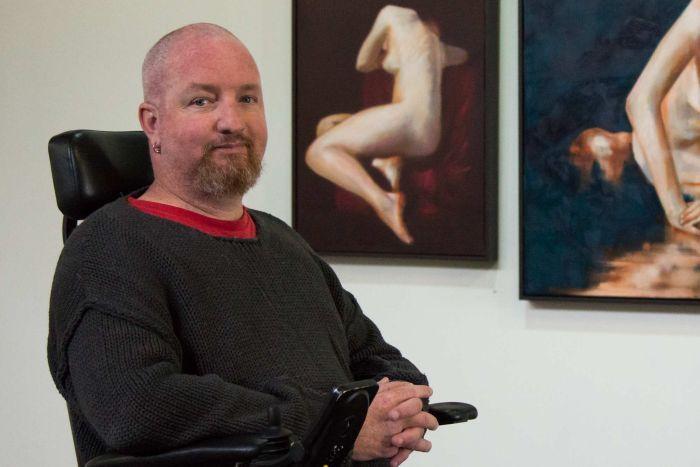
Andrew Grant explores the emotional toll of disability in first solo art exhibition
Andrew Grant was fit and active throughout his teens and 20s working as a labourer, with National Parks and Wildlife and then in hospitality.
But at the age of 28, he slowly found himself struggling to walk up stairs and get out of low furniture.
He was diagnosed with a degenerative neuromuscular condition called inclusion body myositis.
The disease causes Mr Grant's muscles to waste away to the point that he may one day struggle to breathe and swallow.
"To a degree, there was a loss of identity," he said.
"I used to love riding motorbikes, sailing and working on cars and bushwalking and doing active things.
"But as I became more and more disabled I wasn't able to participate in those activities and those were parts of my identity which were starting to splinter away."
That experience is one that Mr Grant has channelled into his work now as a painter.
Following his diagnosis, Mr Grant went back to high school via TAFE to earn his Higher School Certificate before enrolling in art school.
The only campus he could attend was Kogarah TAFE which was wheelchair accessible.
"I found myself at a bit of a crossroads and I took the opportunity to reinvent myself," he said.
YOUTUBE: Andrew Grant and his life as a disabled artist
Accessible painting
Mr Grant started painting large works initially, but had to move on to smaller canvases as he lost movement in his arms.
He bought an electric easel with grant money from Accessible Arts, and has a wheelchair that can be raised and lowered so he can extend his reach around his paintings.
Last week, the 45-year-old launched his first solo exhibition titled The Renaissance Project.
The body of work, which has taken a year to produce, features abstract landscapes and figure paintings of lonely contemplative women and men.

PHOTO: One of Andrew Grant's untitled paintings in his first solo exhibiton (Supplied: Andrew Grant)
"Most of the figure paintings were inspired by this loss of identity and the emotional toll that you experience with the transitioning into a physical disability," Mr Grant said.
"I wanted to expose people to that emotional toll like the solitude, the frustration and angst."
Mr Grant said he had only gravitated towards being defined as a disability artist, as opposed to being recognised simply as "an artist" in the past year, as a way to encourage other disabled people to join the art scene.
"Getting involved in the arts for me has brought me into a creative and nurturing community where I can find acceptance and not be judged.
"It will give you social participation, it will give you a voice."
Following the exhibition, Mr Grant will start on his next project — a "dark and moody" self-portrait to enter into the Archibald Prize.
The Renaissance Project is being exhibited at 107 Projects in Redfern until March 12.
BANNER PHOTO: Supplied: ABC Radio Sydney - Amanda Hoh



